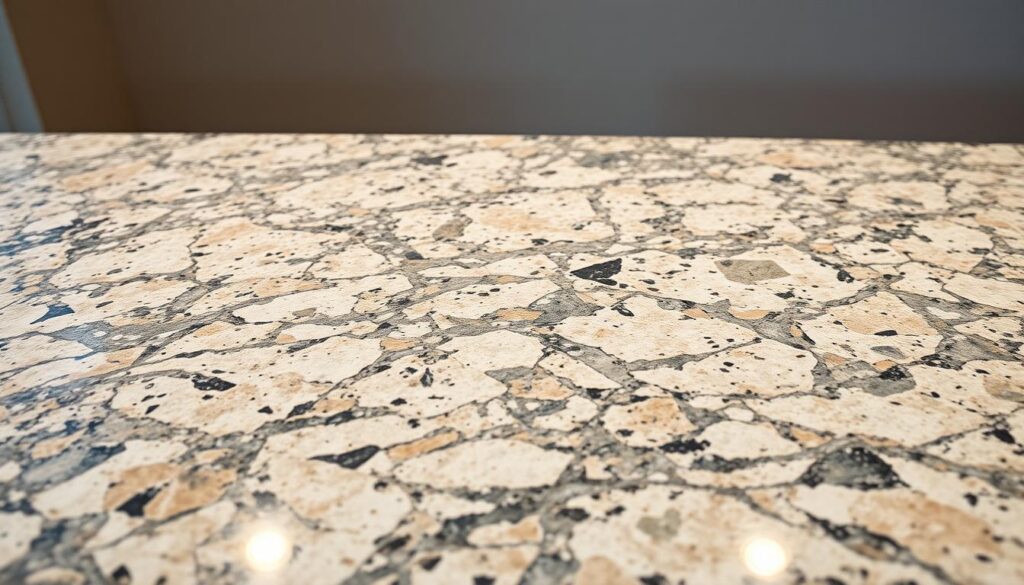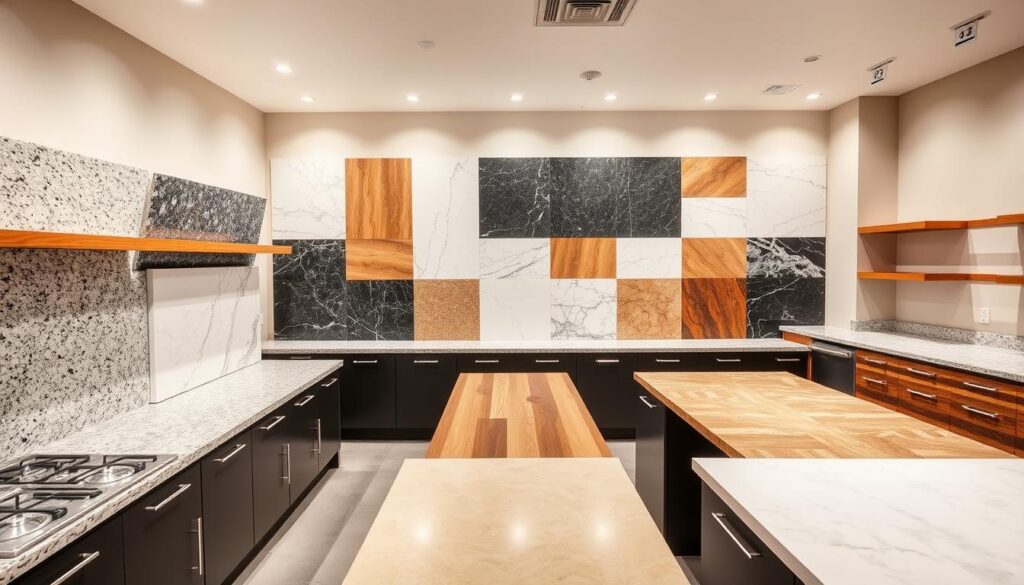Table of Contents
Ever thought about how your kitchen or bathroom countertops affect your home? What are The Pros and Cons of Different Countertop Materials? Knowing the good and bad of different countertop materials is key. This article compares options like granite, quartz, marble, and solid surfaces.
When choosing countertops, it’s important to consider their looks, upkeep, and durability. Each material has its own strengths and weaknesses. For example, natural stone adds beauty but needs more care. Solid surfaces are easier to maintain but might not look as unique.
Want to learn more about countertop materials? Check out this source for more info and help in picking the right one.
Key Takeaways
- Different countertop materials have varying levels of durability and maintenance requirements.
- Natural stone like granite and marble offers unique beauty but may require more upkeep.
- Engineered options such as quartz provide low maintenance with comparable durability.
- Laminate and solid surface materials offer budget-friendly alternatives for cost-conscious homeowners.
- Each material’s cost can vary significantly and should be weighed against its long-term value.
Introduction to Countertop Materials
Choosing the right countertop material is key when updating kitchens or bathrooms. The countertop materials guide highlights many options, each with its own traits. You can pick from granite, quartz, marble, quartzite, solid surfaces, laminate, and wood.
These materials meet different looks and needs. They help you create the perfect space.
Overview of Popular Materials
Granite and quartz are top choices for their lasting quality and classic beauty. Marble adds a touch of luxury but needs regular care. Solid surface countertops are flexible and come in many colors.
Laminate is a cost-effective option. Concrete and recycled glass are also popular for their unique looks and eco-friendliness.
Importance of Choosing the Right Surface
When picking countertop materials, consider durability, upkeep, and style. Each material has its own pros and cons. This affects how happy you’ll be with your choice over time.
For example, quartz is great at resisting stains, perfect for active kitchens. Wood adds warmth but needs extra care. Thinking about these factors helps you make a choice that fits your life and style.
Granite Countertops
Granite countertops are a favorite for kitchens and bathrooms. They look great and last a long time. Knowing the good and bad points of granite is key before you decide.
Pros of Granite
Granite countertops are very durable, lasting over 20 years with care. They can handle heat and scratches well, perfect for busy kitchens. With over 100 colors and patterns, you can make your kitchen truly yours.
Many people see their home value go up by 5-15% after adding granite. It’s a smart choice for those who want to improve their home.
Cons of Granite
Granite has some downsides too. It’s porous, so you need to seal it every 1-3 years to stop stains and bacteria. If you don’t seal it, oils and juices can get trapped.
Installing granite can also cost more because of its weight. This might mean extra work to support the countertops. While many value its durability, the upkeep and installation can be a challenge.

Maintenance Tips
Keeping your granite countertops in good shape is important. Clean them regularly with a mild soap to avoid dirt and stains. Stay away from harsh chemicals that can harm the surface.
Remember to seal your granite on schedule. This step is critical to keep it looking and working well. With the right care, your granite will stay beautiful and functional for years.
Quartz Countertops
Quartz countertops are popular for their looks and function. They are made from 90-95% crushed quartz, resins, and pigments. This mix offers a unique chance to design your home.
Advantages of Quartz
Quartz is non-porous, stopping bacteria growth. It’s also stain and scratch resistant, making cleaning easy. You can choose from many colors and patterns to match your style.
Quartz is easy to care for, needing just a wipe to clean. It doesn’t need sealing like natural stones do. Plus, it’s durable, lasting well in busy areas.
Disadvantages of Quartz
Quartz has some downsides. It can’t handle heat as well as natural stones, only up to 150°F. This is a problem in kitchens with hot dishes.
Seams might show in big installations. Quartz can fade or yellow outside, so it’s not for outdoor kitchens. Strong chemicals can also harm it, so it needs careful handling.
Ideal Uses for Quartz
Quartz is great for kitchens and bathrooms. It has a sleek look that fits modern homes. It’s tough and keeps its appearance well, unlike natural stones.
Marble Countertops
Marble countertops are loved for their luxury and timeless beauty. They are a top choice for kitchens and bathrooms. People enjoy the unique veining and beauty they add to a space. It’s important to know the marble pros and cons before choosing it for countertops.
Benefits of Marble
Marble countertops are great because they can handle heat well. This makes them perfect for baking. The cool surface is also great for tasks like rolling dough.
With the right care, marble can last up to 100 years. This adds a lot of value to a home. Many think marble makes their home more valuable when they sell it. Sealing the surface once or twice a year helps keep it looking luxurious.
Drawbacks of Marble
Marble is also soft, which means it can get scratched easily. Its porous nature can lead to stains if spills aren’t cleaned up right away. Using cleaners with acid, like bleach or vinegar, can also damage the surface.
But, with a little care, marble can stay beautiful. Just use a damp microfiber cloth and mild dish soap daily. Be careful not to damage it.
Design Aesthetics
Marble design trends show its flexibility in different styles. It looks elegant in both modern and traditional settings. The many colors and patterns available make marble a highlight in kitchens and bathrooms.
Quartzite Countertops
Quartzite countertops are becoming more popular. They are strong and look great. They are like marble but last longer. There are good and bad things to know about them.
Strengths of Quartzite
Quartzite is very hard. It’s even harder than granite. This means it can handle scratches and heat well. It’s perfect for kitchens where things get busy.
It can also handle hot pans without getting damaged. The unique patterns and colors make each slab special.
Weaknesses of Quartzite
Quartzite has some downsides too. It needs to be sealed every year or two. This keeps it from getting stained or damaged by water.
It’s also more expensive than granite. And, if you spill something acidic, it can etch. So, you have to clean it carefully to keep it looking good.
Comparisons with Other Materials
Quartzite is special because it’s both beautiful and strong. It’s better than some other materials in these ways. But, it only comes in a few colors.
For many, the unique look is worth it. Quartzite is a good choice for those who want quality and style.
Solid Surface Countertops
Solid surface countertops are becoming more popular in kitchens and bathrooms. They are made of about 33% resin and 66% minerals. This mix creates a smooth, nonporous surface that looks good and works well.

Key Advantages
One big plus of solid surface countertops is how easy they are to keep clean. They don’t need to be sealed, making upkeep simple. They can handle heat up to 320 degrees Fahrenheit, which is great for cooking.
But, they can warp if exposed to very high heat. Scratches can be fixed with fine-grain sandpaper. This makes them perfect for kitchens, bathrooms, and even commercial areas. They’re also lighter than granite and marble, which is a plus for places with weight limits.
Limitations to Consider
Even with their benefits, solid surface countertops have some downsides. They don’t really increase a home’s value. They also don’t have the same look as stone, like granite or marble. This lack of depth and natural patterns is a drawback.
They can scratch easily, but scratches can be fixed. Knowing the pros and cons helps homeowners decide if they’re right for their space.
Best Locations for Solid Surfaces
Solid surfaces are best in places that see a lot of use and need to be easy to clean. Kitchens and bathrooms are perfect for them because they’re durable and resistant to stains and moisture. They’re also great for commercial areas, travel trailers, and laundry rooms.
Cost Considerations
When planning a renovation, knowing the cost of countertops is key. Prices vary a lot based on the material’s quality, where it’s from, and how hard it is to install. For example, laminate countertops are cheaper, costing between $10 to $40 per square foot.
Granite is pricier, ranging from $40 to $100 per square foot. The most expensive options can go over $200. Marble and quartz countertops are also pricey, costing between $50 to $150 per square foot.
Price Range for Different Materials
Quartz countertops cost between $50 to $100 per square foot. The top-quality ones can reach up to $150. Quartzite, known for being tough, costs between $60 to $150 per square foot.
Wood countertops have a wide price range, from $20 to $100. This depends on the wood type and quality. Custom concrete countertops are more expensive, costing between $100 to $150 per square foot. With such a wide range, choosing the right material is important.
Cost vs. Value Analysis
When looking at countertops, consider both the upfront cost and long-term value. Materials like granite and quartz are durable and need little upkeep, which can increase your home’s value. On the other hand, cheaper options like laminate might need to be replaced more often, leading to higher costs over time.
Looking at how long each material lasts and how much upkeep it needs can help you see its true value. This helps homeowners make smart choices for their money.
Environmental Impact of Countertop Materials
Homeowners are now thinking about the environmental impact of countertops. Choosing sustainable materials can greatly reduce a home’s environmental footprint. Knowing the options helps make choices that are good for the planet.
Sustainable Options
There are many sustainable countertop materials to choose from. Natural stones like granite and slate are durable and need less energy to process. Engineered quartz combines natural quartz with recycled materials, making it a green choice.
Solid surface countertops are also energy-efficient. But, they often use non-renewable resources. This makes them less eco-friendly than other options.
Eco-Friendly Considerations
Choosing eco-friendly countertops means looking at their whole life cycle. Materials like reclaimed wood, bamboo, or recycled paper are great for reducing waste. Solid surface countertops can’t be recycled easily because of their chemical makeup.
Quartz surfaces, on the other hand, can be made with recycled materials. This makes them more sustainable. Checking for certifications like Health Product Declarations and Environmental Product Declarations helps find sustainable products.
How Rock Solid Tops Can Help
Rock Solid Tops offers a wide range of countertop options. They help clients choose the best materials for their needs. Their goal is to make the selection process easy and satisfying.
Consultation Services
Choosing the right countertop is important. Rock Solid Tops provides expert advice on materials like granite and quartz. They ensure clients find the perfect fit for their space.
Fabrication and Installation Process
After choosing a material, Rock Solid Tops excels in fabrication and installation. With over 30 years of experience, they guarantee top-notch craftsmanship. Clients can trust their countertops will be installed perfectly.
Commitment to Quality and Service
Quality is Rock Solid Tops’ top priority. They offer excellent products and service, big or small projects. Visit Rock Solid Tops to learn more.
Conclusion
Countertop materials come in many types, each with its own pros and cons. Granite is known for its durability and heat resistance, boosting a home’s value. Marble, on the other hand, offers a luxurious look but needs careful care.
Knowing these details is key to making a smart choice for your kitchen or bathroom. A countertop materials summary can help you find the right mix of looks, durability, and price.
Summary of Material Choices
When choosing, think about maintenance needs and installation costs. Granite and quartz are tough and scratch-resistant, but marble’s classic beauty comes with more upkeep. For a budget-friendly option, consider laminate or tile.
Understanding countertop materials helps you make a choice that fits your needs. It’s all about finding the right balance.
Call to Action: Contact Rock Solid Tops
Ready to start your countertop project? Talking to experts can be a game-changer. Call Rock Solid Tops at (612) 270-4239 or email info@rocksolidtops.com for top-notch advice and personalized help.
Their team in Minneapolis and nearby areas is ready to help. They’ll make sure you pick the perfect material for your space.


